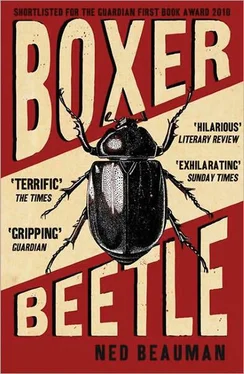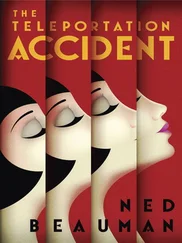By the side of the road there was a heap of burnt wood like a badger’s funeral pyre. ‘What’s that?’ said Erskine as the cart rattled past.
‘A sort of shrine, I think,’ replied Gittins, and said something to the driver in Polish. The driver’s reply was so long that Erskine wished he had never raised the subject, but finally the driver did finish and Gittins translated.
‘A hundred years ago it seems there was a monk called Jakub, who lived in the monastery up in the mountains. One day he went into his abbot’s study to find him … well, doing something unspeakable with the daughter of the blacksmith from down here in Fluek, whose great-grandchildren still live nearby. Jakub, outraged, killed the abbot with a dagger, and then, stricken with guilt and panic, fled the monastery. Coming to this road, he dropped the dagger where that shrine is now, stole a horse and rode north towards Gdansk. Along the way, after witnessing evil and misery of all kinds and helping where he could, he met God in a tavern.’
‘I see.’
‘Jakub asked God why He allowed human brutality to go unchecked in all its awfulness. God replied that He merely gave human beings free will, which he could never take back. But Jakub argued that free will is a frail thing, always a slave to our animal instincts — if God wanted us to have real free will, why did he make men so hot-headed at the same time? God told Jakub that he had already heard these arguments from his angels, and he had ignored them then too. But at last, in frustration, God suggested to Jakub a pact, whereby any man who wanted to murder another man would now get the chance to think it over without passion. Jakub would become the saint of repentant murderers: whenever one man killed another, Jakub would appear to that man, give him as long as he needed to consider properly what he’d just done, and ask if he regretted it. If he did, the man could take back the murder and it would be as if nothing had ever happened. If he didn’t, then at least he would have acted with true free will. And if the scheme were successful, it would be extended to all sin. Jakub would become the second-greatest redeemer that ever lived.’ In the distance Erskine spotted a thin plume of smoke above the darksome fir trees — they were nearing the village. ‘Jakub agreed, of course, but as soon as he did he realised that God had tricked him. He would go years at a time, coming upon thousands of scenes of carnage, before finding a single person who would not do just the same thing if given a second chance. People kill, Jakub realised, because it suits us to, and our baser urges are just an excuse. In the end, he saw that he had been lying even to himself: he was glad he’d killed the abbot, and wouldn’t change a thing about what had happened. He went to God and asked if he could give up the task, now that he had been shown how wrong he was about human nature and about his own. And God denied him his freedom, as a punishment for the abbot’s murder. Rather a striking fable, isn’t it? Now it seems that everyone who passes by throws a log or a stick on the pile, and every so often somebody sets light to it. The fire calls to Jakub, asking him to help the people of his village choose wisely in troublous times.’
Just as Gittins finished, Erskine was nearly thrown from the cart as one of its front wheels was sucked into a hole in the road. They both got out to help the driver and found themselves up to their ankles in mud. Because of the cold everything hurt a bit more than it should have. The smell of the horses reminded Erskine of his uncle’s disastrous attempts to teach him to ride back in Claramore when he was twelve. He already wished he had never come on this trip.
And, indeed, he could hardly remember why he had ever thought it might be a worthwhile way to spend a fortnight. In November, Benjamin Percy, who’d just come back from the Ukraine, had made a rousing speech to the Royal Entomological Society in which he argued that, while people were only too happy to go all the way to Africa or Asia, there was a lamentable neglect of unexotic old eastern Europe, ‘where every time you shake out your boot in the morning some unknown subgenus will fall on the floor’. Percy himself had come back with a few very intriguing new grubs. So several new expeditions had been organised, including this one to a region south of Bialystok, part-funded by Erskine’s own father. There were supposed to be five men coming, but three had dropped out for one reason or another, leaving Erskine alone with John Gittins.
Gittins was a fat otter-faced bureaucrat in his fifties who for nearly twenty years had carried around a glass vial containing a small colony of cimicids — bedbugs — which every night he tipped out on to his hairy thigh so that they could feed on his blood as part of some obscure long-running experiment into mandible size versus nutritional preferences. Reportedly, when he checked out of hotels he would often forget the vial and then dash back to his room almost in tears in case the maids had smashed it underfoot. When he wasn’t talking about his cimicid colony, Gittins was almost invariably talking about his feud with Francis Hemming CMG CBE, the formidable lepidopterist secretary of the International Commission on Zoological Nomenclature. The full details of the dispute were far too complex for anyone but Gittins himself to understand, but Erskine did know that, on the final day of a recent series of consultations in Lisbon, Gittins had been intending to table a revolutionary motion about mail ballots which would have shaken Hemming’s tyranny, and, anticipating this, Hemming had got up first and spoken uninterrupted for nearly five hours about malarial parasite classification, so that the meeting had to be adjourned for the sake of the tired old men on the committee before Gittins could begin his revolt. Gittins was now determined to destroy Hemming by any means possible, and would be willing, Erskine suspected, to sacrifice not only his own life but probably also his wife’s, his daughter’s and even his cimicids’ to prevent Hemming getting the knighthood to which he aspired. Gittins’ only non-entomological hobby was languages, of which he could speak nearly a dozen, including Polish. He had a mole on his neck with six long wiry hairs sticking out of it, as if a spider had been shot from a catapult and embedded itself in his flesh.
Closer to the village, they passed grey fields of barley and beetroot. Fluek itself, chosen for the diversity of the nearby terrain, was nothing but some cottages, some barns, some stables, an inn and a church — whose roof had been cracked ever since the Bolsheviks came through in 1920 — all huddled together. Several of the timber buildings were patched up with incongruous sheets of rusting corrugated iron which must have been plundered from a nearby battlefield. There was something so submissive and exhausted about the place, thought Erskine, like a thin farmer munching on grass because his own fat cattle have bullied him out of his hot dinner again.
They all got out of the cart, and after the driver had hitched the horses to a post he led the two Englishmen to the inn. On the way, Erskine noticed several old women in shawls glaring at them from doorways.
‘They don’t seem very pleased to see us,’ he murmured to Gittins. Was this the ‘evil eye’ he had read about?
‘No, they certainly don’t,’ replied Gittins, and said something to the driver. Erskine cringed — he hadn’t intended Gittins to relay his comment, and now the idiot was certain to cause offence. But the driver replied in a casual tone, and Gittins said, ‘He said we shouldn’t have arrived today. Today is the birthday of — well, I don’t know the word — the “angel child”, I think. The grandmothers think that’s bad luck, he says. He doesn’t believe it himself.’
Читать дальше











